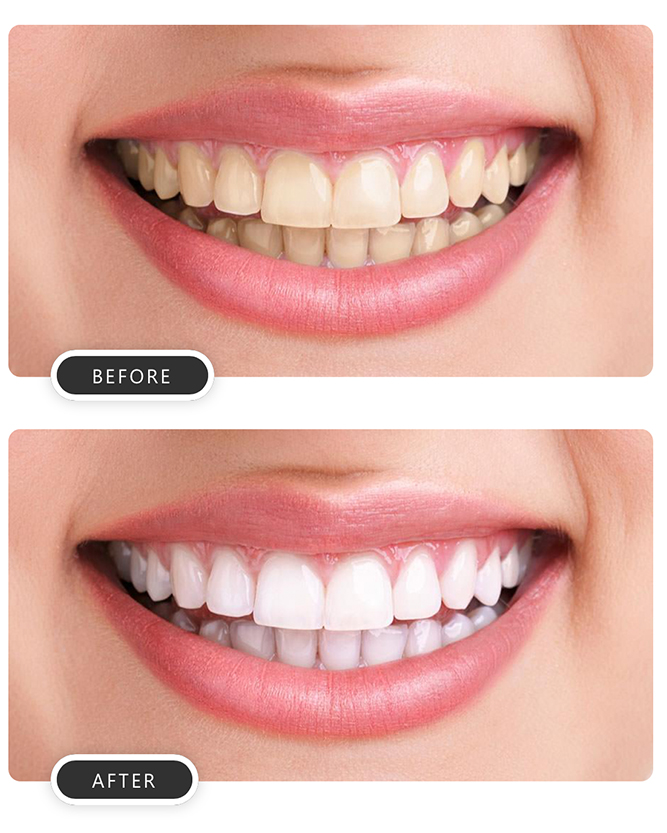Tooth whitening can be a very effective way of lightening the natural colour of your teeth without removing any of the tooth surface. It cannot make a complete colour change, but it may lighten the existing shade.
Why You May Need Teeth Whitening
A great smile is a great social asset and can boost self-confidence, so it’s no surprise, whitening treatments are now more popular than ever. Teeth whitening can improve your appearance for an upcoming job interview or special occasion, such as a wedding or graduation. You can also use whitening to reduce the effects of tooth discolouration or achieve a more youthful appearance.

Causes of Tooth Discolouration
There are many reasons teeth can become discoloured. Risk factors include but are not limited to:
- Coffee, tea, cola and red wine
- Ingredients such as berries, apples, potatoes and certain spices
- Poor dental hygiene
- Advancing age
- Smoking
- Genetic factors
- Some medications
- Diseases
It is advisable to visit a dentist to better understand the cause of your tooth discolouration and get professional help on how to manage the problem.
Suitability for Teeth Whitening
Before deciding to use a tooth whitening procedure, it is advisable to consult with a dentist and discuss the type and severity of discolouration you are experiencing and your motivations for undergoing the treatment. Individuals should be mature enough to understand the risks and limitations of the procedure.
Not all types of tooth discolouration will respond the same way to whitening procedures. Whitening typically works best on yellow teeth and is less effective on grey, brown or black stains. It is important to have realistic expectations of how much improvement is possible. Human teeth are not perfectly white and vary in colour for each person. Treatment will not completely whiten teeth but will instead lighten the colour.
Whitening may not be appropriate for you, if:
- You have crowns or plastic fillings (whitening can affect the bond between fillings and teeth)
- You have cavities or early cavities
- You have a gum condition such as a gum recession
- You have sensitive teeth or gums
- You are pregnant or breastfeeding
- You are under 18
Consult with your dentist to determine what treatments are available for your individual circumstances.
Risks and Possible Complications for Teeth Whitening
Teeth whitening is safe when done correctly by a professional, although minor complications are possible. Some people notice their teeth are more sensitive during the 24 hours following treatment. Others report irritation of the gums, which is probably due to whitening gel leaking from the teeth. Too many treatments can leave the tooth looking pale and translucent. This change can be permanent and would require replacement of the tooth to fix – a major procedure.
People are often eager to obtain the best possible results with their treatment. Sometimes the gel is left in for too long in the hope of achieving whiter teeth. This can cause the chemicals to penetrate too deeply and damage the inner layer of the tooth, the pulp.
To avoid complications from using take-home whitening products, ask your dentist for advice or invest in a professional whitening treatment.
